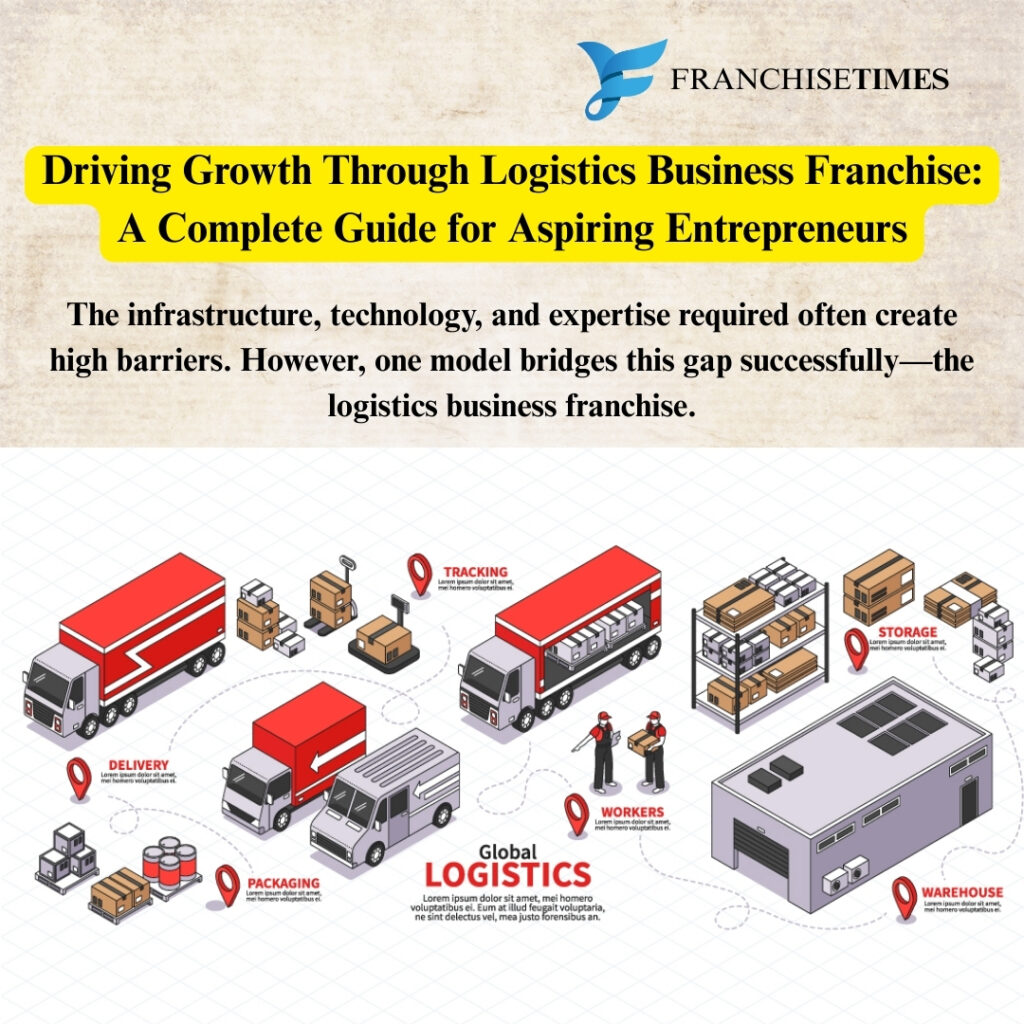Driving Growth Through Logistics Business Franchise: A Complete Guide for Aspiring Entrepreneurs
The logistics industry has become the backbone of global trade and e-commerce. Businesses across sectors depend on efficient supply chain networks to keep their products moving. As consumer demand for faster deliveries and cost-effective distribution rises, logistics services are expanding rapidly. For entrepreneurs, entering this sector independently can feel overwhelming. The infrastructure, technology, and expertise required often create high barriers. However, one model bridges this gap successfully—the Logistics Business Franchise Growth.

Franchising in logistics allows you to run a business under the brand name and systems of an established player. You gain access to proven strategies, operational support, and ready-made customer networks. This lowers the risk and increases the probability of success. More importantly, it opens the doors to a sector worth billions with immense growth opportunities.
In this article, you will discover everything about starting a logistics business franchise. From understanding its potential and benefits to identifying opportunities, challenges, and steps for success, this guide will cover it all. Whether you are a first-time entrepreneur or a businessperson seeking diversification, this roadmap will help you build confidence in choosing the right path.
Why a Logistics Business Franchise Is the Future of Entrepreneurship
The logistics industry continues to grow at an impressive rate. Factors such as e-commerce expansion, globalization of supply chains, and rising consumer expectations fuel this growth. By 2030, logistics is expected to be one of the fastest-growing service industries worldwide. But why should entrepreneurs focus specifically on a logistics business franchise instead of starting from scratch?
First, the industry is capital-intensive. Setting up warehouses, transportation fleets, software systems, and workforce management requires massive investments. Most independent startups struggle to handle these costs. With a franchise model, you get pre-built infrastructure and reduced financial risks.
Second, logistics is about trust and efficiency. Customers demand reliability. An unknown new company often fails to attract clients in the early stages. A franchise, however, carries the reputation of a recognized brand. That credibility alone can win contracts and customer loyalty.
Third, technology plays a critical role. From GPS tracking to warehouse automation, the right digital tools are essential. Franchise networks invest heavily in technology and make them available to partners. This saves entrepreneurs from expensive mistakes and outdated systems.
Finally, the sheer size of the opportunity cannot be ignored. Every product that moves—from groceries to electronics—depends on logistics. As online shopping and manufacturing networks expand, logistics franchises offer unlimited earning potential.
By entering this sector through a Logistics Business Franchise Growth, entrepreneurs position themselves at the intersection of demand, technology, and customer trust. It is a future-ready move with sustainable returns.
Key Benefits of Owning a Logistics Business Franchise
Choosing a logistics business franchise offers a blend of independence and security. While you own and manage your branch, you operate under a tested system. This combination delivers several advantages that independent ventures cannot easily replicate.
1. Brand Recognition
Customers instantly recognize established franchise brands. This saves time and effort in building trust from the ground up. In logistics, reputation is everything. Businesses will not risk unreliable delivery partners. A strong franchise name can secure contracts faster.
2. Training and Support
Franchisors offer comprehensive training programs for new partners. From handling shipments to managing customer queries, you learn everything step by step. Continuous support ensures you never feel lost, even during challenges.
3. Access to Technology
Running a logistics company without technology is nearly impossible today. Franchise partners receive access to advanced software systems, real-time tracking tools, and automated solutions. This helps reduce errors, increase efficiency, and satisfy customers.
4. Proven Business Model
Instead of experimenting with strategies, you get a business plan that already works. This minimizes risks and boosts profitability. Franchises succeed because the systems are tried, tested, and regularly updated.
5. Shared Marketing Resources
Promoting an independent business requires high investments. With a franchise, national and regional campaigns already exist. You benefit from the parent company’s marketing reach while focusing on local promotions.
6. Growth Opportunities
A franchise system often allows expansion. Once you stabilize one location, you can scale up by managing multiple branches. The network grows stronger with every new unit.
Overall, the benefits create a safety net for entrepreneurs. Instead of facing challenges alone, you become part of a larger ecosystem. This partnership improves the chances of long-term success in the competitive logistics market.
Challenges in Starting a Logistics Business Franchise
While the opportunities are enormous, every venture has challenges. Being aware of them prepares you for better decision-making. A logistics business franchise requires commitment, patience, and careful planning.
1. Initial Investment
Although franchising reduces risks, it still requires financial commitment. Franchise fees, infrastructure setup, and working capital must be managed wisely. Entrepreneurs should explore financing options or partnerships to ease the load.
2. Operational Demands
Logistics is a 24/7 industry. Deliveries, warehouse operations, and customer queries continue around the clock. Running a franchise demands strong time management and dedication. Owners must prepare for long hours, especially in the early phase.
3. Competition
The logistics sector is highly competitive. Many players, both global and local, operate in this market. To stay ahead, franchise owners must deliver exceptional service and continuously improve efficiency.
4. Adapting to Technology
Even with franchisor support, adapting to new technologies may feel challenging. Entrepreneurs need to stay open to learning and updating skills regularly. Resistance to technology can lead to missed opportunities.
5. Economic Fluctuations
Logistics depends heavily on trade, manufacturing, and consumer demand. Economic downturns can slow business. Franchise owners must plan for tough times and diversify revenue streams.
Despite these challenges, the support system of a franchise cushions the impact. Entrepreneurs with persistence and adaptability usually thrive in this environment.
Steps to Start a Successful Logistics Business Franchise
For aspiring entrepreneurs, knowing the right steps ensures a smoother journey. Starting a logistics business franchise involves planning, research, and execution.
Step 1: Research the Market
Understand local demand. Study customer needs, major industries, and existing logistics players in your region. This analysis helps in selecting the right franchise partner.
Step 2: Choose the Right Franchise
Not all logistics franchises are the same. Some focus on courier services, while others specialize in freight, warehousing, or supply chain solutions. Select one that matches your interest, budget, and long-term vision.
Step 3: Assess Financial Requirements
Calculate the total investment. Include franchise fees, warehouse or office rent, staff salaries, and operational costs. Create a financial plan to manage expenses smoothly during the initial months.
Step 4: Complete Legal Formalities
Register your business, obtain licenses, and sign agreements with the franchisor. Ensure all contracts are transparent and protect your interests. Consulting a legal expert is advisable.
Step 5: Set Up Infrastructure
Depending on the model, you may need storage space, vehicles, or digital systems. The franchisor usually guides you through this setup. Make sure your facilities comply with safety and operational standards.
Step 6: Hire and Train Staff
Employees are the backbone of logistics. Hire skilled staff for warehouse management, transportation, and customer service. Training programs from the franchisor help maintain quality.
Step 7: Launch and Promote
Plan a launch event or promotional campaign in your region. Use both digital and offline marketing to attract businesses. Highlight the strength of your franchise brand.
Step 8: Deliver Quality Consistently
Success in logistics comes from reliability. Ensure on-time deliveries, transparent communication, and quick issue resolution. Consistency builds trust and long-term contracts.
By following these steps, you establish a strong foundation for your franchise. Over time, dedication and strategic growth can turn it into a highly profitable venture.
Future Outlook of Logistics Business Franchises
The future of logistics looks extremely promising. As businesses and consumers demand faster, smarter, and eco-friendly delivery solutions, logistics companies will expand further. For entrepreneurs, owning a logistics business franchise means being part of this transformation.
Several trends shape the industry’s future:
- E-commerce Boom: Online retail continues to grow, driving demand for last-mile delivery.
- Technology Integration: Artificial intelligence, blockchain, and robotics are becoming essential in logistics.
- Sustainability: Green logistics with electric vehicles and eco-friendly packaging is gaining attention.
- Global Trade Expansion: Cross-border e-commerce creates opportunities for international logistics.
- Customer-Centric Models: Personalized delivery options and faster service will dominate the market.
Franchise owners who stay updated and adapt to these changes will enjoy sustainable growth. With the support of franchisors, they can innovate and remain competitive.
Conclusion
A Logistics Business Franchise Growth is more than just an entrepreneurial opportunity—it is a gateway into one of the most powerful industries of the future. By leveraging brand reputation, advanced technology, and proven business models, entrepreneurs can overcome barriers and achieve success.
The journey is not without challenges, but the support and structure of franchising make it manageable. With careful planning, strong dedication, and a focus on customer satisfaction, franchise owners can create lasting businesses.
For aspiring entrepreneurs, the message is clear: the time to invest in a logistics franchise is now. The industry is expanding, demand is growing, and opportunities are abundant. By taking the right steps today, you can secure a future that drives growth for years to come.
